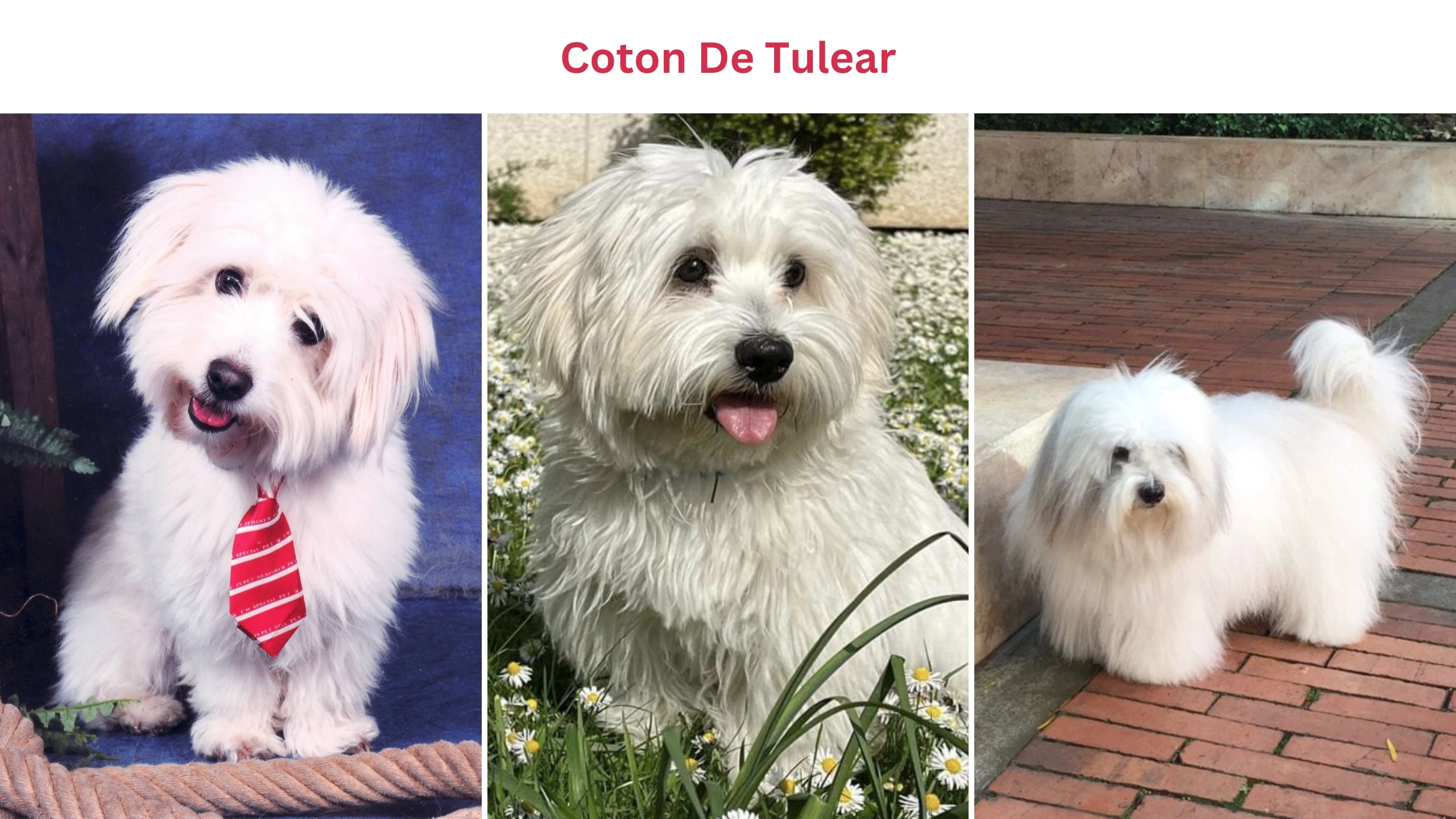Last Updated on February 11, 2024 by Aftab Tariq
Coton de Tulear is a charming breed hailing from Madagascar and is often considered synonymous with joy and companionship. This breed, along with its close relatives like the Bichon Frise and Maltese, captures the hearts of dog lovers worldwide.
With its distinctive cotton-like coat, Coton de Tulear is a favorite among apartment dwellers and families with kids. Responsible breeders play a crucial role in maintaining the breed’s health, emphasizing health screenings and ethical breeding practices.
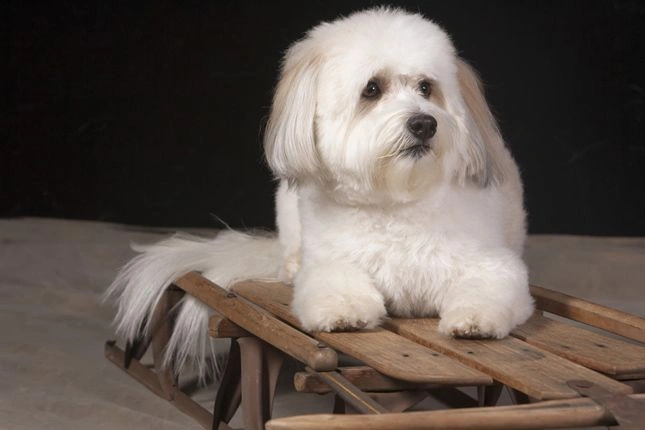
When bringing a Coton de Tulear into your home, creating a loving environment that caters to their well-being is essential. These dogs, known for their friendly temperament, become not just pets but cherished companions.
Well-raised Coton de Tulear puppies make ideal family dogs. Prospective pet parents benefit from researching the breed’s characteristics fostering harmonious relationships. Rescue organizations offer a second chance, making Cotons a delightful choice in the dog world for those seeking loving companions.
Overview of Coton de Tulear
The Coton de Tulear, originating from the enchanting island nation of Madagascar, is a captivating breed that has gained popularity worldwide. This small, fluffy companion is often likened to the Bichon Frise and Maltese, with a distinctive cotton-like coat that adds to its charm.

The breed’s African roots are evident in its unique characteristics and friendly demeanor. The Coton de Tulear, associated with the seaport city of Toliara, arrived through sailors, boasting a name that translates to “Cotton of Tulear” due to its soft coat.
Adaptable from Starbucks to a quiet room, this delightful companion thrives in various environments. Despite its small size, the breed’s big head exudes personality. Popular worldwide, the Coton de Tulear brings love and joy, fitting seamlessly into apartments or spacious homes.
Its affectionate nature makes it a cherished addition to any household, captivating dog lovers globally.
Coton de Tulear Facts
History of Coton de Tulear
In the 1970s, the Coton de Tulear embarked on a journey from Madagascar, initially cherished by French households and royalty. Beloved, especially among ladies, these small dogs ventured to Europe and eventually reached North America. Acknowledged by the American Kennel Club (AKC) and the United Kennel Club, the Coton de Tulear officially became a recognized breed.
Their history includes serving as ratters on ships, surviving shipwrecks, and finding new homes as cherished members of families globally. Today, this breed connects its past to the present, bringing joy to households worldwide.
Coton de Tulear Highlights
Origin: The Coton de Tulear derives its name from the French term “coton,” signifying cotton, reflecting its fluffy and cotton-like coat. The addition of “Tulear” pays homage to the city in Madagascar, where these delightful dogs have their roots. Affectionately called “Cotons,” they embody charm and charisma.
Appearance: Cotons are petite dogs with a distinctive cottony coat, soft and dense. Their expressive round eyes, black noses, and lively, intelligent expressions add to their allure. Medium-sized triangular ears complete their endearing appearance.
Size: A small breed, Cotons typically weigh between 8 to 13 pounds (3.6 to 5.9 kilograms) and stand at a shoulder height of about 9 to 11 inches (23 to 28 centimeters).
Coat: The highlight of their appearance is their long, soft, and cotton-like jacket, characterized by hair rather than fur. Renowned for their hypoallergenic qualities, Cotons make an excellent choice for individuals with allergies.
Temperament: Coton de Tulears are celebrated for their friendly, affectionate, and playful nature. Described as joyful and pleasant, they effortlessly mingle with children and other pets, adding entertainment to their clownish behavior.
Intelligence: Highly intelligent and quick learners, these dogs excel in obedience training and shine in dog sports and agility competitions.
Health: While generally robust, Cotons, like all breeds, may face certain health concerns. Common issues include hip dysplasia, luxating patella (kneecap dislocation), and dental problems due to their small mouths and crowded teeth.
Coton de Tulear Lifespan: A typical lifespan of 14 to 16 years, Coton de Tulears enjoy a relatively long life for a small breed.
Maintenance: Their long, cottony coat demands regular grooming to prevent matting and tangling. Routine brushing, baths, and occasional professional grooming are essential to maintain their skin in optimal condition.
Coton de Tulear Personality
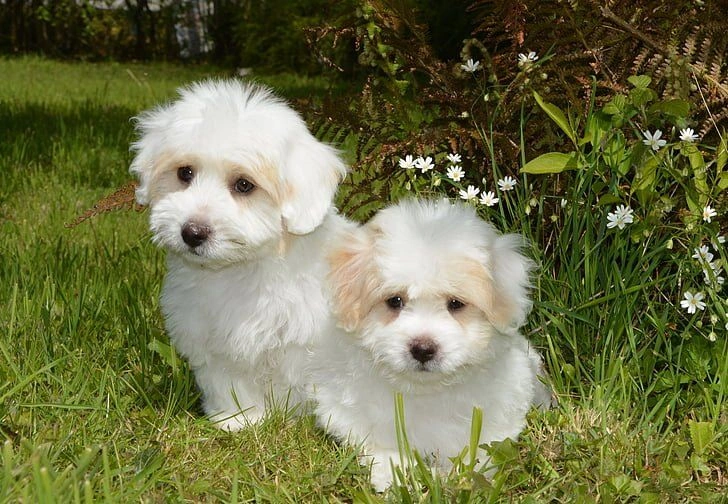
The personality of the Coton de Tulear is a delightful blend of charm and playfulness. Known for forming strong bonds with their family members, these small yet sturdy dogs are natural attention seekers, captivating humans with their affectionate nature.
Both males and females exhibit a people-pleaser attitude, eagerly responding to praise and food rewards. Despite their small stature, Cotons are fearless and alert, quickly identifying intruders with a lively response.
Their playful antics, coupled with a touch of clownish behavior, make them a constant source of fun and joy. When guarding their home, these furry companions take the risk seriously, ensuring that nothing goes unnoticed, even the sound of a doorbell.
Overall, the Coton de Tulear’s personality is a perfect blend of loyalty, playfulness, and an instinct to protect, making them cherished members of any household.
Intelligence and Sociability of Coton de Tulear
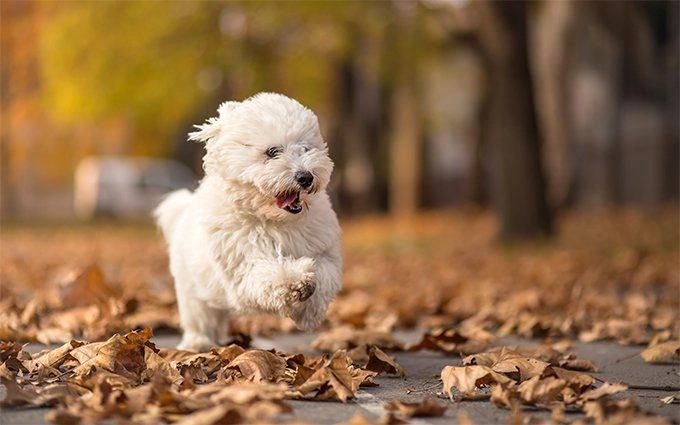
The Coton de Tulear stands out as a breed known for its remarkable intelligence and delightful sociability. Whether on journeys or playtime in the yard, these dogs exhibit a keen eye for interaction and a love for engaging in games like fetch.
Their affinity for human companionship makes them excellent travelers and perfect ladies and gentlemen on any ship or room. The Coton de Tulear’s need for social interaction is met through various activities and routines, ensuring they remain not just pets but integral family members.
With a plush coat and playful demeanor, these canines add a touch of joy to every empty-nester’s home, providing plenty of opportunities for exercise needs and shared adventures. Their sociability shines through in their interactions with people and other pets, making them a delightful addition to any household.
Obedience and Agility of Coton de Tulear
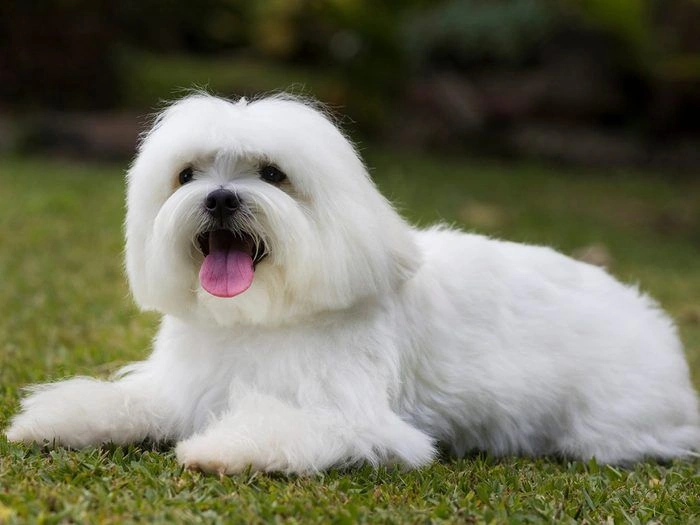
The Coton de Tulear, a breed renowned for its obedience and agility, is a versatile and trainable canine best friend. This breed, characterized by its luxurious coat, requires regular brushing and a nurturing environment to thrive.
From responding promptly to a doorbell to being an excellent housebreaker, the Coton de Tulear showcases its obedience in various situations. In the agility world, these dogs navigate through doors and spaces with remarkable agility, making them a great choice for retirees seeking a lively companion.
Their ability to stay obedient in different places and times is a testament to their adaptability. Despite occasional vocalizations like grunts and growls, the Coton de Tulear poses no risk but adds joy and love to everyone they encounter.
Coton de Tulear Size
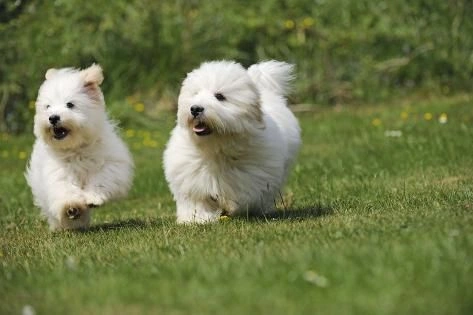
The shoulder height of male Cotons ranges from 10 to 12.5 inches, and their weight may range from 9 to 13 pounds. Females are often a little bit more petite, ranging from 8.5 to 11 inches and weighing 8 to 11 pounds.
This breed’s compact size suits them perfectly for various living environments, from apartments to spacious homes. The Coton de Tulear’s small stature and delightful personality make them an ideal and adaptable companion for individuals and families alike.
Coton de Tulear Health
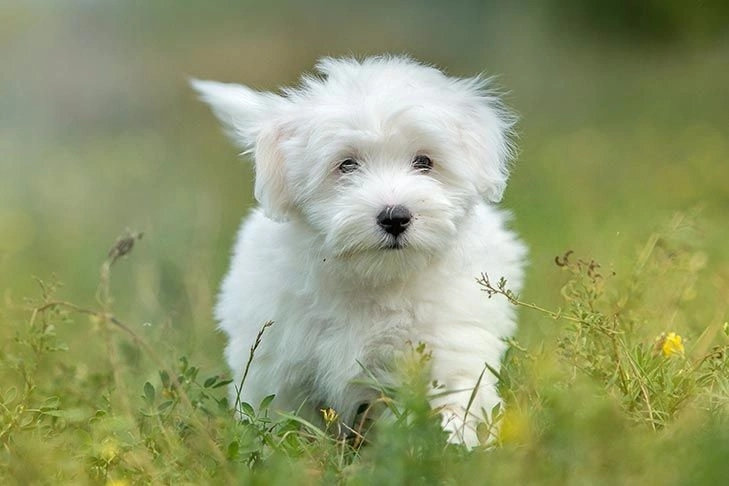
The Coton is considered to be a healthy breed overall. The following is a list of conditions that have been seen in Cotons; however, the incidence of these conditions is rather low among the species as a whole:
Luxating Patellas in Cotons
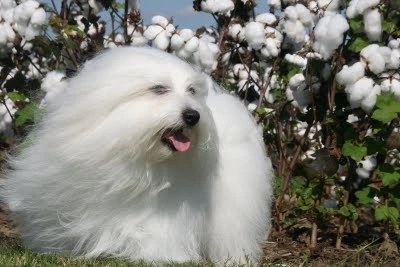
The health of Cotons, like the health of dogs of any breed, is not guaranteed to be perfect, and luxating patellas are one possible exception to this rule. It’s possible for these little dogs, who are renowned for their lively disposition, to have problems with either their knee joints or their patellas. These sorts of issues can occur, impeding their movement and making them uncomfortable.
Breeders and puppy owners need to be vigilant about signs of this condition, ensuring that these furry companions can continue their playful flights without hindrance. Regular veterinary check-ups can help identify and address any potential problems in the early stages, keeping the joints in their proper place.
Progressive Retinal Atrophy in Pieces of Cotton
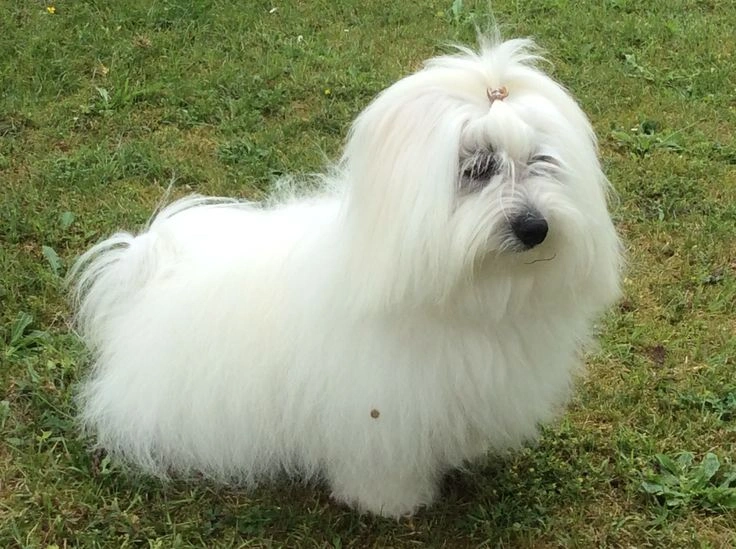
Progressive Retinal Atrophy (PRA) is a genetic concern affecting Cotons and other breeds. This gradual degeneration of the photoreceptors in the eyes leads to eventual blindness.
Breeders play a vital role in minimizing the prevalence of this disease through responsible breeding practices. Regular check-ups with an ophthalmologist can help detect early signs, allowing for proactive measures.
Ensuring a comfortable environment, free of hazards like sharp furniture edges, helps these dogs adapt to potential blindness and continue living a fulfilling life despite the challenges. Awareness and proactive care are key to managing these health aspects in Cotons.
Responsible breeders ensure the health of a puppy’s parents through certifications. In the case of Cotons, you should find Orthopedic Foundation for Animals (OFA) certificates covering knees, hips, elbows, and hearts.
Additionally, a Canine Eye Registry Foundation certification for eye health is typically provided, and some breeders may include OFA thyroid certifications.
It’s important to note that health clearances are only issued to dogs aged 2 years or older, as some health issues may manifest in full maturity. Consequently, breeding is often recommended to be postponed until dogs are two or three years old to prioritize their overall well-being.
Hip Dysplasia in Pieces of Cotton
While Cotons are generally robust, hip dysplasia (HD) can concern some dogs. This orthopedic hip dysplasia refers to a condition in which the hip joint does not fit correctly into the hip socket, leading to lameness, pain, and discomfort.

Responsible breeders focus on factors like genetics and diet to minimize the risk. Regular screenings, such as those provided by organizations like Both the Orthopedic Foundation for Animals (OFA) and the Hip Improvement Program at the University of Pennsylvania, are crucial for early detection.
Managing factors like slippery floors and ensuring a balanced diet contribute to preventing the development of this condition in dogs.
Coton de Tulear Care
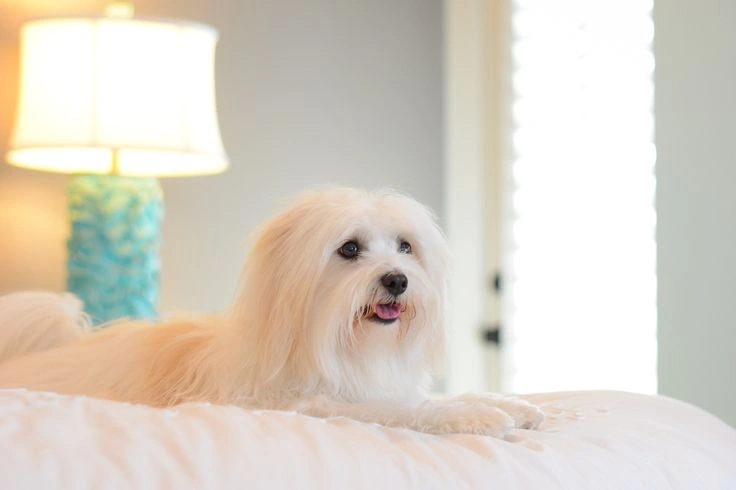
Coton de Tulears require special care to thrive in various environments. Whether in apartments or spacious ranch houses, their adaptability makes them suitable for different living situations. Establishing a consistent schedule for outings, training, and play is crucial, as these dogs thrive on routine.
Crate training can be a valuable tool, especially for apartment dwellers, providing a secure space for these small, friendly cottons. Positive reinforcement through praise and treats aids in their training, ensuring they understand their role in the family and community.
Their love for people and friendly manner make them excellent companions for those willing to invest time and effort in their care, regardless of the weather – rain or snow.
Coton de Tulear Feeding
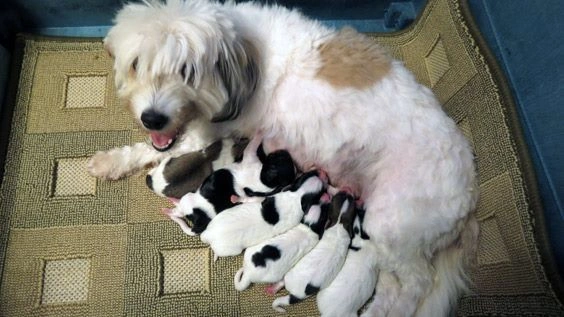
Proper feeding is essential for the well-being of Cotons, considering factors like age, activity level, and size. Understanding the difference in dietary needs between a playful pup and a more relaxed couch potato dog is key.
Owners should use their hands and thumbs to assess the amount of food, ensuring their dogs maintain a healthy shape with visible but not protruding ribs and a discernible waist.
Regular exercise contributes to a healthy metabolism, and quality dog food tailored to the individual’s needs supports their overall health. Monitoring their build and adjusting meals accordingly ensures these delightful dogs lead happy and healthy lives.
Coton de Tulear Colors
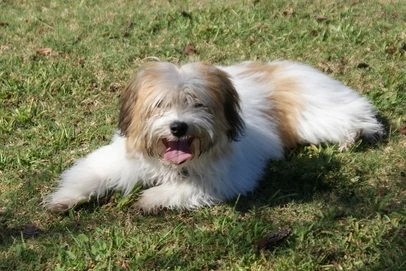
The Coton de Tulear comes in various coat colors, ranging from champagne and red to rust and shadings of color. From puppyhood to adulthood, these small cottons display multiple features, including distinctive spots and a charming mixture of hues.
Paying attention to coat care is essential, as these dogs are prone to hair breakage and need regular grooming. Owners use tools like a pin brush and a comb to maintain the texture of their luxurious fur.
Ears, legs, and the body all require care, with minimum grooming efforts ensuring their coat remains vibrant and healthy. A spray conditioner and the occasional use of a topknot add the finishing touch to their delightful appearance.
Coton de Tulear Grooming
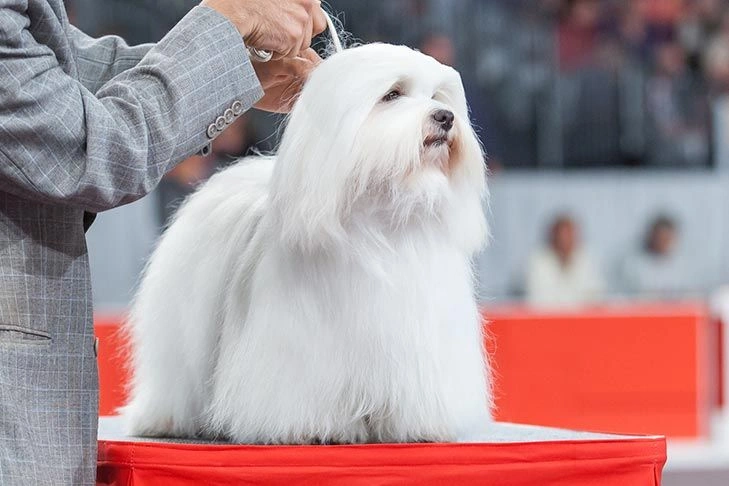
Hygiene is a priority, focusing on ears, feet, and nails. Owners praise and reward their dogs during grooming sessions, making it a positive experience.
Bath time, dental care, and occasional veterinary exams contribute to these charming kinds of cotton’s overall health and well-being, ensuring they remain happy and radiant.
Coton de Tulear
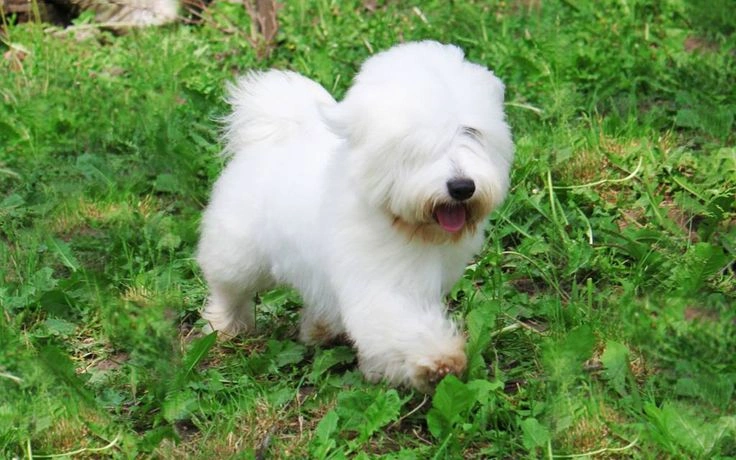
Cotons de Tulear seamlessly blend into family life, especially with children and other pets. Known for their gentle nature, these small dogs become beloved playmates for kids and canines alike. The soft, cotton-like coat of Cotons invites peaceful interactions, making them an ideal company for children.
These furry companions are not just part of the family; they are the life of the party, bringing joy and warmth to the hearts of all. Whether sharing food, engaging in playful antics, or wagging their fluffy tail, Cotons enrich the lives of people, young and old, creating a harmonious bond within the family unit.
Coton de Tulear Breed Organizations
The well-being of the Coton de Tulear breed is a priority for responsible breeders and Coton de Tulear Breed Organizations. These organizations play a crucial role in guiding decisions regarding breeding stock, ensuring that only healthy and well-cared-for dogs become part of the breeding process.
Unlike backyard breeders motivated solely by profit, these organizations provide lifetime support, emphasizing the importance of health and ethical breeding practices throughout a dog’s life.
By maintaining high standards and addressing potential health problems, they contribute to the overall well-being of Cotons, ensuring that each generation of puppies is a positive result of responsible breeding efforts.
Frequently Asked Question
Why Are Coton de Tulears So Expensive?
Do Coton de Tulear Bark a Lot?
How Much Does a Coton Dog Cost?
What Is the Difference Between Coton de Tulear VS Maltese?
What Kind of Dog Is a Coton de Tulear Poodle Mix?
How Does ‘Coton de Tulear Shedding’ Compare to Other Breeds, and What’s Their Grooming Routine?
Source
I am a dedicated content writer with more than five years of experience, particularly skilled in the art of storytelling. My writing journey commenced during my college years, where I pursued journalism and unearthed my talent for creating captivating narratives.

